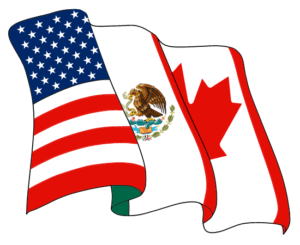The U.S, Mexico and Canada will begin renegotiating NAFTA this Wednesday at the Marriott Wardman Park hotel in Washington DC.
Inside US Trade reports that “initial talks will focus mostly on logistics and agenda-setting… Negotiators are expected to establish working groups for specific issue areas, identify their NAFTA-country counterparts and pinpoint the contentious issues that will take longer to negotiate. Negotiators will also exchange their priorities for the renegotiations, which could include agreeing on what issues will not be renegotiated. This will allow the negotiators to construct a chronology for the talks as they move forward.”
Canadian Minister of Foreign Affiars Chrystia Freeland gave speech on Canada’s negotiating objectives this morning. She said that NAFTA should be updated to address changes in technology “in a way that ensures we continue to have a vibrant and internationally competitive technology sector and that all sectors of our economy can reap the full benefits of the digital revolution.”
ICTSD reported last week that Mexico’s trade negotiations may include “updated rules of origin, while keeping market access gains seen under the original deal on goods and services trade, as well as updating intellectual property provisions in the accord.” Mexico may also want to change the way disputes are handled under Chapter 19.
The U.S. Trade Representative released its negotiating objectives last month. The objectives for intellectual property are
Promote adequate and effective protection of intellectual property rights, including through
the following:
- Ensure accelerated and full implementation of the WTO Agreement on Trade-Related Aspects of Intellectual Property Rights (TRIPS), particularly with respect to meeting enforcement obligations under TRIPS.
- Ensure provisions governing intellectual property rights reflect a standard of protection similar to that found in U.S. law.
- Provide strong protection and enforcement for new and emerging technologies and new methods of transmitting and distributing products embodying intellectual property, including in a manner that facilitates legitimate digital trade.
- Prevent or eliminate discrimination with respect to matters affecting the availability, acquisition, scope, maintenance, use, and enforcement of intellectual property rights.
- Ensure standards of protection and enforcement that keep pace with technological developments, and in particular ensure that rightholders have the legal and technological means to control the use of their works through the Internet and other global communication media, and to prevent the unauthorized use of their works.
- Provide strong standards enforcement of intellectual property rights, including by requiring accessible, expeditious, and effective civil, administrative, and criminal enforcement mechanisms.
Prevent or eliminate government involvement in the violation of intellectual property rights, including cybertheft and piracy.
Secure fair, equitable, and nondiscriminatory market access opportunities for United States persons that rely upon intellectual property protection.
Respect the Declaration on the TRIPS Agreement and Public Health, adopted by the World Trade Organization at the Fourth Ministerial Conference at Doha, Qatar on November 14,2001, and to ensure that trade agreements foster innovation and promote access to medicines.
Prevent the undermining of market access for U.S. products through the improper use of a country’s system for protecting or recognizing geographical indications, including failing to ensure transparency and procedural fairness and protecting generic terms.





